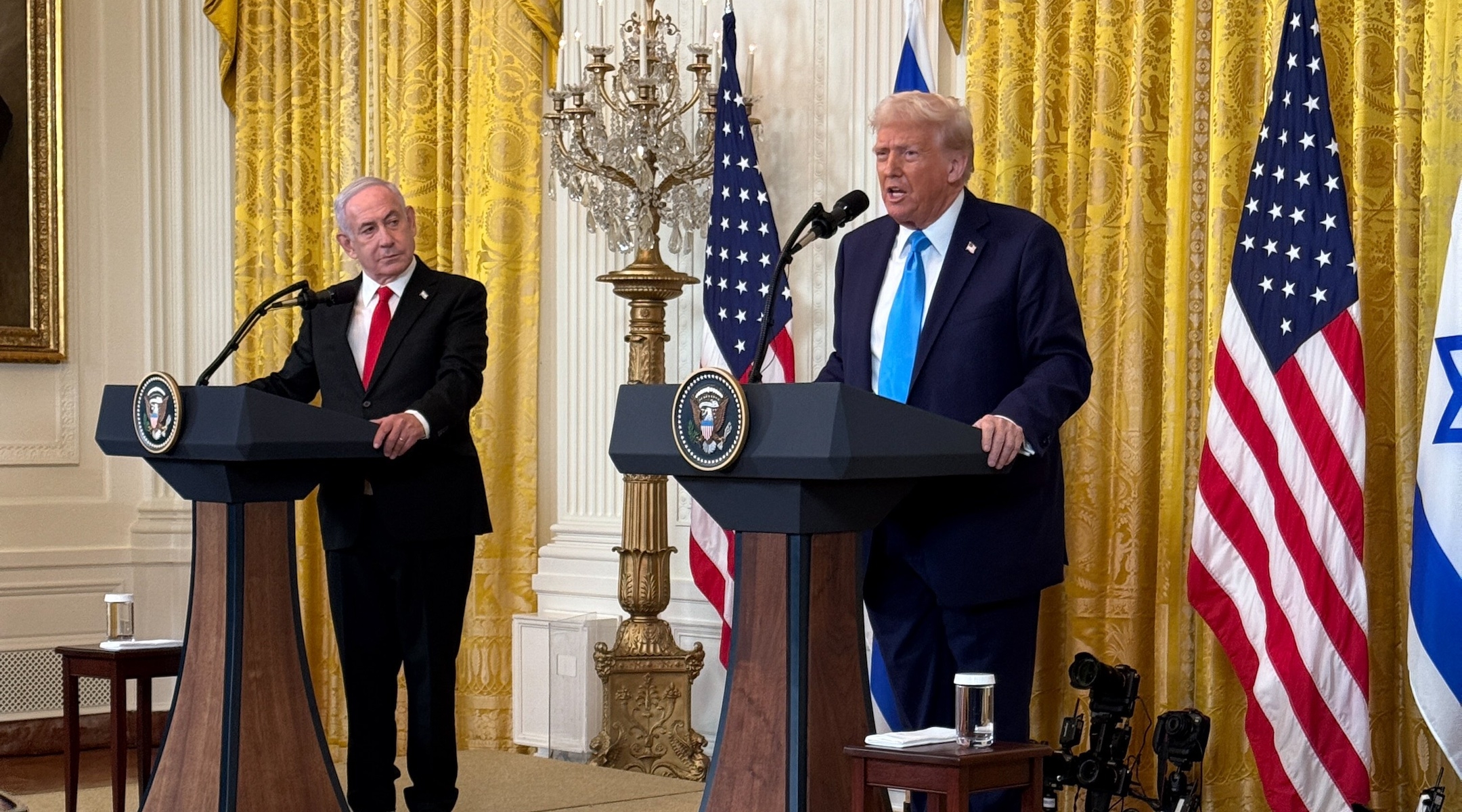A year ago, the Jewish author Sarah Bernstein received the Giller Prize, a prestigious $100,000 Canadian literary award founded by a Jewish philanthropist, for her novel “Study For Obedience.”
That ceremony was broadcast on the CBC, which edited out a moment of pro-Palestinian protest during the broadcast. That brief disruption, which came shortly after the outbreak of the Israel-Hamas war, would be a harbinger of what awaited the Giller Prize.
Ahead of this year’s ceremony on Monday, dozens of Canadian authors announced they were withdrawing their books for consideration from the Giller prize in protest of its ties to companies that do business with Israel. Several of those writers are Jewish, and one who lent her support is the prize’s most recent recipient, Bernstein.
“As authors, we cannot abide our work being used to provide cover for sponsors actively investing in arms funding and Israel’s ongoing genocide of Palestinians,” reads the July open letter from the 45 boycotting authors. “To be clear: we will not be content with half-measures. Our goal is to truly win an arts and culture sector free from arms funding. Arts institutions cannot launder their moral reputations with empty statements calling too late for a ceasefire, or toothless guarantees that they will support authors’ free speech and right to protest.”
The letter demanded that the prize’s leadership pressure its main sponsor, Scotiabank, to divest from an Israeli weapons manufacturer. It also demanded that the prize cut ties with the Azrieli Foundation, a charity that funds pro-Israel causes and is named after Canadian-Israel real estate developer and billionaire David Azrieli, who served in Israel’s prestate militia. The letter accused him of participating in the Nakba, or the mass displacement of Palestinians during Israel’s founding (Azrieli died in 2014). It also demanded that the prize sever ties with two Jewish philanthropists who fund the campus group Hillel and provide stipends for Israeli soldiers.
Bernstein’s signature on the letter was also notable because she has been embraced in literary and Jewish circles, including by the Jewish Public Library of Montreal, for the ways in which “Study For Obedience” chillingly tackles antisemitism. The novel, her second, follows unnamed siblings who have taken up residence in an unspecified country and begin to experience a constant drumbeat of antisemitism at the hands of the locals — even as they gradually become perpetrators of various misdeeds themselves. (The siblings are never explicitly referred to as Jewish, but contextual clues, like the quoting of the infamous line “None is too many,” which Canada’s minister of immigration used to refer to Jews in 1939, make it obvious.)
Neither the Giller Prize nor Bernstein responded to requests for comment.
The boycott meant that the Giller Prize joined a long list of cultural institutions, particularly in publishing, that have faced upheaval since Oct. 7, 2023. But unlike at many of those institutions, the Giller boycott prompted an extensive, partially public negotiation between the prize and the protesting authors.
Two international members of the prize’s jury also resigned over its sponsors’ Israel ties, and Bernstein also pulled out of a planned appearance with a Giller-affiliated virtual book club, because, she claimed, she had been advised ahead of time that any mention of Gaza would be edited out.

Elana Rabinovitch, Scotiabank Giller Prize Executive Director, attends the 2023 Scotiabank Giller Prize ceremony at Four Seasons Hotel Toronto on November 13, 2023 in Toronto, Ontario. (Jeremychanphotography/Getty Images)
In response, after months of back-and-forth, the Giller Prize’s Jewish executive director Elana Rabinovitch sought to partially appease the protesters. When this year’s finalists were announced in September, the prize publicly dropped the name of Scotiabank.
“Ultimately, more than ever, we want to ensure the prize stays true to its purpose: to celebrate the best in Canadian fiction and to give the stage to Canada’s best storytellers,” Rabinovitch said in a statement at the time. “For us, that means ensuring the focus remains solely on the prize and the art itself.”
That gesture marked one of the few post-Oct. 7, 2023, instances in which an embattled cultural organization has taken a concrete step to appease its pro-Palestinian protesters. But it did little to curb backlash. Though it is now unnamed — and, before the boycott, had scaled back its investments in Elbit, the Israeli weapons manufacturer spotlighted by the protesters — Scotiabank remains a sponsor of the prize through next year.
One of the letter’s authors remarked to the Toronto Star that removing the bank’s name while retaining it as a sponsor was “a PR stunt, intended to reduce outcry.” The petition’s other demands have remained unaddressed.
In an open letter published after the Scotiabank announcement, eight Giller Prize-winning authors, including Bernstein, argued that “the only way to remedy what has been a deeply divisive period in Canadian arts” was for cultural funders “to divest from companies whose products are currently being used in mass killing.”
The letter continued, “As previous winners of Canada’s most prestigious literary prize, we have all benefited from money donated by these banks, posed for photos with their executives, and been obliged to participate in their public relations machine. It is not so outlandish a thing, then, to ask the same corporate entities to listen to the artists they claim to respect.”
The Giller Prize won’t be the only literary award ceremony this week to attract the wary attention of Jews. The U.S.-based National Book Awards, which take place on Wednesday, have also been scrutinized this year for the sponsoring foundation’s decision to grant a lifetime achievement honor to Paul Coates, an influential Black publisher who recently republished an infamous antisemitic essay from the 1990s. Coates is the father of Ta-Nehisi Coates, whose recent book on the West Bank also ignited a firestorm of controversy.
For Rabinovitch — whose father Jack Rabinovitch founded the prize in 1994 in memory of his late wife Doris Giller — negotiating demands around Israel has been a tightrope walk.
“The Giller Awards is not an advocacy group or a political organization,” she recently told Toronto Life magazine. “We are a literary foundation that celebrates excellence in Canadian fiction, and now I’m being asked by many writers to change that and to make the awards into something that they’re not.
“You cannot achieve peace in the Middle East by dismantling a literary arts organization,” she said.
Privately, according to emails shared with the Toronto Star, Rabinovitch has accused the boycotting authors of targeting her “because of my Jewy last name.” After the September open letter, she emailed some of the authors accusing them of “Jew-hatred” and declaring, “This has the unmistakable whiff of a pile-on, of bullying and outright intimidation.”
After the article, Rabinovitch posted, and then deleted, an accusation directed at two of the prior prizewinners, claiming they had leaked her email communications.
“I’ve broken bread with these people, travelled with them and exchanged confidences. It’s tragic that they’re personally targeting me, bullying me, to achieve some sort of political end,” Rabinovitch wrote on social media, according to a screenshot. “Shame.”
She also told the Star that she had written those emails “at a time of rising antisemitism with acts of hatred being directed not just at the Jewish community but at Palestinian-Canadians and many other communities too.”
She added, “We all should try to respect each other’s heightened sensitivities and the fear that flows from trauma.”
Support the Jewish Telegraphic Agency

Help ensure Jewish news remains accessible to all. Your donation to the Jewish Telegraphic Agency powers the trusted journalism that has connected Jewish communities worldwide for more than 100 years. With your help, JTA can continue to deliver vital news and insights. Donate today.









 English (US) ·
English (US) ·